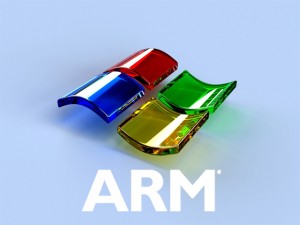ARM has joined forces with Microsoft to tune the Windows OS to work on processors based on ARM’s 64-bit architecture, the company said this week.
Ian Forsyth, programme manager at ARM, could not comment on a specific release date for the 64-bit version of Windows for ARM processors, but said ARM is continuously working with software partners to add 64-bit support.
ARM did not respond to requests for comment on additional details regarding the collaboration with Microsoft on building 64-bit support for Windows. Microsoft did not respond to a request for comment. ARM’s TechCon show is currently going on in Santa Clara, California.
Microsoft last week released Windows RT, an OS that is 32-bit and works with ARM processors, and also released Windows 8, which works on x86 processors and is 64-bit. ARM this week announced its first 64-bit processor designs, Cortex-A57 and Cortex-A53, which are based on ARM’s Armv8 architecture. The chip designer said that it expects servers and mobile devices based on the processors to reach the market in 2014.
Windows RT is on tablets with 32-bit processors from Nvidia and Qualcomm. Microsoft’s Surface and Asus’ Vivo Tab RT tablet have Nvidia’s quad-core Tegra 3 processor, while Dell’s XPS 10 and Samsung’s P8510 Ativ Tab have Qualcomm’s dual-core Snapdragon S4 processor.
The 32-bit Windows RT OS has a limited memory ceiling, and a 64-bit Windows RT OS would expand the memory capacity in tablets and PCs. A 64-bit version of Windows on ARM would also bring it on par with Windows 8.
Nvidia is developing a processor core based on ARM’s 64-bit architecture under the code-name Project Denver. Nvidia declined to comment on development of 64-bit software for Windows.
A Qualcomm spokeswoman said the company cannot comment at this time on specific product plans. However, Qualcomm is an ARM partner and helps explore and evaluate emerging technologies including 64-bit software support, the spokeswoman said in an e-mail.
Microsoft’s interest isn’t surprising since the move to 64-bit seems like a natural progression for ARM and supporting vendors, just as it was for x86, said Charles King, principal analyst at Pund-IT.
But software would need to be written to support the 64-bit ARM instruction set, and porting many x86 64-bit applications is a challenge, King said. Existing applications that ran on previous versions of Windows do not run on RT.
“From a purely technical perspective, porting many common x86 applications to ARM is problematic,” King said.
There are also questions on how developers will take the move from 32-bit to 64-bit, King said. But if customers want applications, the developers will deliver.
“These are some of the obvious challenges. Fortunately, everyone involved has a year or more to sort things out,” King said.






